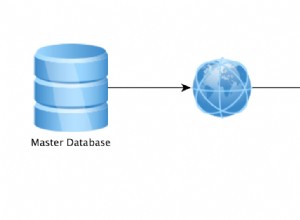Hier ist ein vereinfachtes Beispiel, das ich vor einiger Zeit für eine ähnliche leistungsbezogene Frage gemacht habe, das die Vorteile von innodb-clusterierten Primärschlüsselindizes nutzt (offensichtlich nur mit innodb verfügbar !!)
- https://dev.mysql. com/doc/refman/5.0/en/innodb-index-types.html
- http:/ /www.xaprb.com/blog/2006/07/04/how-to-exploit-mysql-index-optimizations/
Sie haben 3 Tabellen:Kategorie, Produkt und Produktkategorie wie folgt:
drop table if exists product;
create table product
(
prod_id int unsigned not null auto_increment primary key,
name varchar(255) not null unique
)
engine = innodb;
drop table if exists category;
create table category
(
cat_id mediumint unsigned not null auto_increment primary key,
name varchar(255) not null unique
)
engine = innodb;
drop table if exists product_category;
create table product_category
(
cat_id mediumint unsigned not null,
prod_id int unsigned not null,
primary key (cat_id, prod_id) -- **note the clustered composite index** !!
)
engine = innodb;
Am wichtigsten ist die Reihenfolge des geclusterten zusammengesetzten Primärschlüssels product_catgeory da typische Abfragen für dieses Szenario immer mit cat_id =x oder cat_id in (x,y,z...) beginnen.
Wir haben 500.000 Kategorien, 1 Million Produkte und 125 Millionen Produktkategorien.
select count(*) from category;
+----------+
| count(*) |
+----------+
| 500000 |
+----------+
select count(*) from product;
+----------+
| count(*) |
+----------+
| 1000000 |
+----------+
select count(*) from product_category;
+-----------+
| count(*) |
+-----------+
| 125611877 |
+-----------+
Sehen wir uns also an, wie sich dieses Schema bei einer ähnlichen Abfrage wie Ihrer verhält. Alle Abfragen werden kalt (nach dem Neustart von MySQL) mit leeren Puffern und ohne Abfrage-Caching ausgeführt.
select
p.*
from
product p
inner join product_category pc on
pc.cat_id = 4104 and pc.prod_id = p.prod_id
order by
p.prod_id desc -- sry dont a date field in this sample table - wont make any difference though
limit 20;
+---------+----------------+
| prod_id | name |
+---------+----------------+
| 993561 | Product 993561 |
| 991215 | Product 991215 |
| 989222 | Product 989222 |
| 986589 | Product 986589 |
| 983593 | Product 983593 |
| 982507 | Product 982507 |
| 981505 | Product 981505 |
| 981320 | Product 981320 |
| 978576 | Product 978576 |
| 973428 | Product 973428 |
| 959384 | Product 959384 |
| 954829 | Product 954829 |
| 953369 | Product 953369 |
| 951891 | Product 951891 |
| 949413 | Product 949413 |
| 947855 | Product 947855 |
| 947080 | Product 947080 |
| 945115 | Product 945115 |
| 943833 | Product 943833 |
| 942309 | Product 942309 |
+---------+----------------+
20 rows in set (0.70 sec)
explain
select
p.*
from
product p
inner join product_category pc on
pc.cat_id = 4104 and pc.prod_id = p.prod_id
order by
p.prod_id desc -- sry dont a date field in this sample table - wont make any diference though
limit 20;
+----+-------------+-------+--------+---------------+---------+---------+------------------+------+----------------------------------------------+
| id | select_type | table | type | possible_keys | key | key_len | ref | rows | Extra |
+----+-------------+-------+--------+---------------+---------+---------+------------------+------+----------------------------------------------+
| 1 | SIMPLE | pc | ref | PRIMARY | PRIMARY | 3 | const | 499 | Using index; Using temporary; Using filesort |
| 1 | SIMPLE | p | eq_ref | PRIMARY | PRIMARY | 4 | vl_db.pc.prod_id | 1 | |
+----+-------------+-------+--------+---------------+---------+---------+------------------+------+----------------------------------------------+
2 rows in set (0.00 sec)
Das sind also 0,70 Sekunden kalt - autsch.
Hoffe das hilft :)
BEARBEITEN
Nachdem Sie gerade Ihre Antwort auf meinen obigen Kommentar gelesen haben, scheinen Sie eine von zwei Möglichkeiten zu haben:
create table articles_to_categories
(
article_id int unsigned not null,
category_id mediumint unsigned not null,
primary key(article_id, category_id), -- good for queries that lead with article_id = x
key (category_id)
)
engine=innodb;
oder.
create table categories_to_articles
(
article_id int unsigned not null,
category_id mediumint unsigned not null,
primary key(category_id, article_id), -- good for queries that lead with category_id = x
key (article_id)
)
engine=innodb;
hängt von Ihrem typischen ab Abfragen, wie Sie Ihre geclusterte PK definieren.




